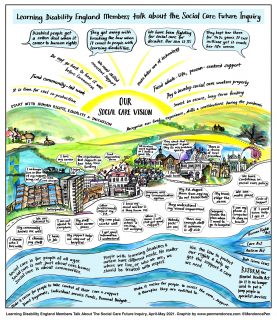
Blog from the Task Force Advisory Group Co Chairs Alex Fox, Rachel Moody and Trevor Wright

This blog is part of our series on the future of social care.
If you have heard politicians debating social care in the last few weeks, you would think that social care is just for older people and that the main problem with it is money.
Many people with learning disabilities and autistic people know that neither of these things are true.
Social care is also about helping people of all ages to live well, when they need extra support to do ordinary things like live independently, take part in community activities, or go to work.
It is true that councils are not given enough money to run good social care services for everyone who needs them.
But even many of those services which do have enough money need to change to fit with how people want to live their lives.

What was the Task Force Advisory Group?
People with learning disabilities and autistic people and people working in organisations and councils came together during the pandemic to help the government to understand and respond to the impacts of COVID-19 on people and families.
The group was co-chaired by Rachel Moody and Trevor Wright, both Experts by Experience and Alex Fox of the charity Shared Lives Plus.
We fed our ideas back to the then social care Minister Helen Whately MP and other people in the government and in councils. We also shared what we’d learned about making our group more accessible, which it wasn’t to begin with.
Read the response from the Co Chairs to the Task Force here (easy read)

Recommendations
We did make recommendations about money and equipment for social care provider organisations which had many problems when the pandemic started with getting and affording PPE, tests and the money and support they needed to work in ways that kept people safe from infection.
We also wanted the government to do more to make sure that accessible information about the pandemic was produced in time, and to work with local user-led and community groups to help people find their way to and through that information.
People themselves need to be involved in co-producing accessible information and all kinds of organisations and services, not just social care ones, need to take it much more seriously so that people with learning disabilities and autistic people don’t end up confused, frightened or unable to do ordinary things when rules change.
Many day support services stopped during the pandemic. Some don’t look like they are going to open again. This has left some people very isolated and some families struggling to cope.
We recommended that councils do more to find out who is struggling, including people and families who didn’t get any social care before the pandemic but might need it now.
No councils should assume that someone doesn’t need a service just because they appear to have ‘managed’ without. Any decisions about changes to support need to be made with people and not rushed.
We heard that loneliness and isolation has got worse through the lockdowns.
We recommended a government funding plan for voluntary, community and social enterprise (VCSE) organisations to support funding people and families who may be at risk of crisis.

The future
There is a need for investment in community building in the short term, through the VCSE sector, and for the long-term social care reform plan to have a strong focus on communities, inclusion and the role of the VCSE sector.
It’s good that there is now a national autism strategy. We called for a whole-life learning disability strategy too.
You will see that these ideas are about much more than social care services and how to pay for them: they are about people being able to live good lives!